Comparing Marx and Weber's Perspectives on Religion and Culture
VerifiedAdded on 2022/12/29
|6
|1348
|44
Essay
AI Summary
This essay provides a comparative analysis of Karl Marx and Max Weber's perspectives on the relationship between religion, culture, and political economy. It begins with an overview of political economy and then delves into the contrasting viewpoints of Marx and Weber. Marx's historical materialism and class conflict theories are contrasted with Weber's focus on the Protestant ethic and rationalization. The essay explores their differing methodologies, with Marx employing a structural approach and Weber adopting a subjective value theory. It examines their views on social class, capitalism, and the role of religion in economic development. The analysis highlights Marx's emphasis on economic factors and Weber's focus on the influence of religious values. The essay concludes by acknowledging the complexities of determining whose arguments are more convincing, as both scholars offer valuable insights into the dynamics of society and economic change, and their contributions to understanding the interplay between religion, culture, and capitalism.
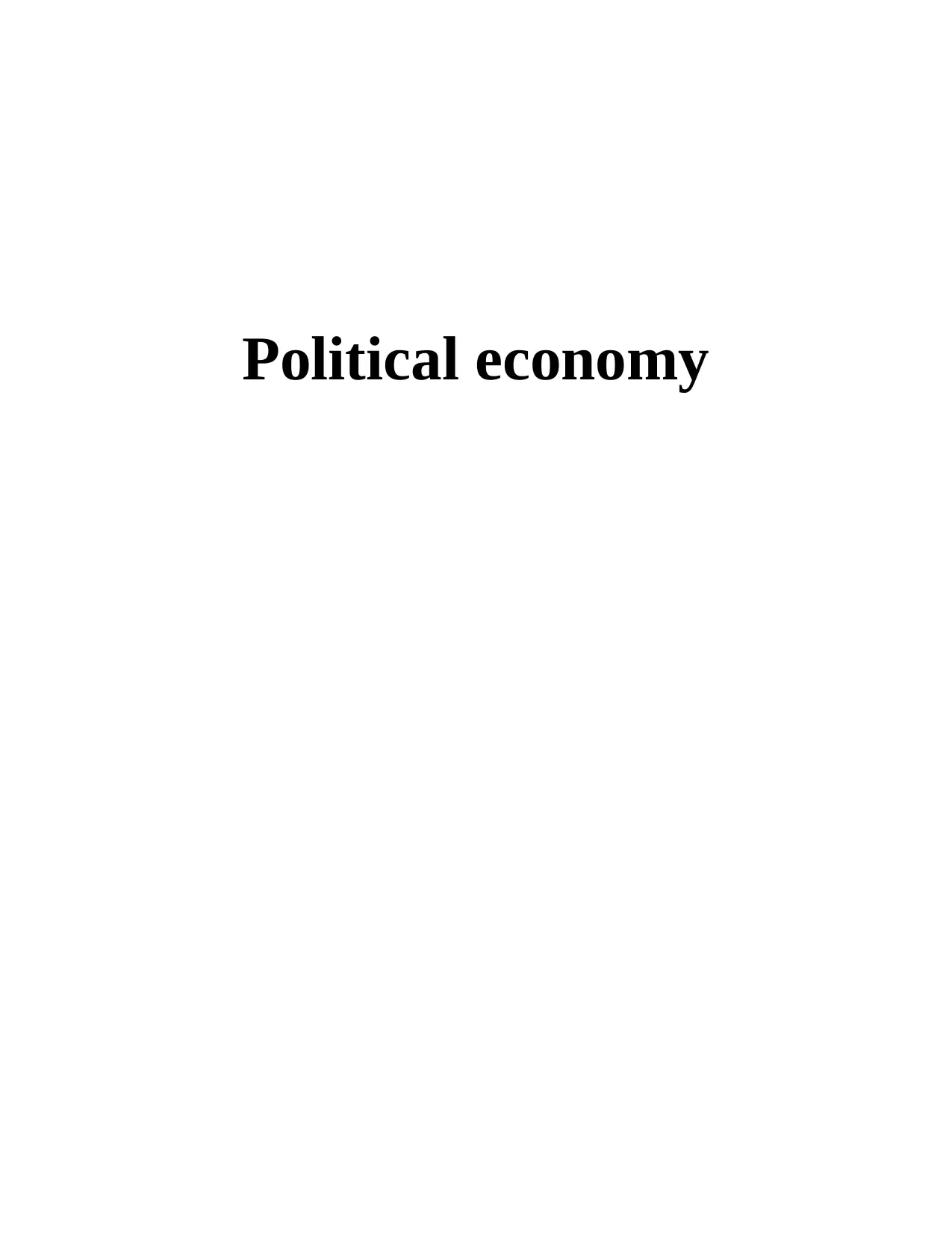
Political economy
Paraphrase This Document
Need a fresh take? Get an instant paraphrase of this document with our AI Paraphraser
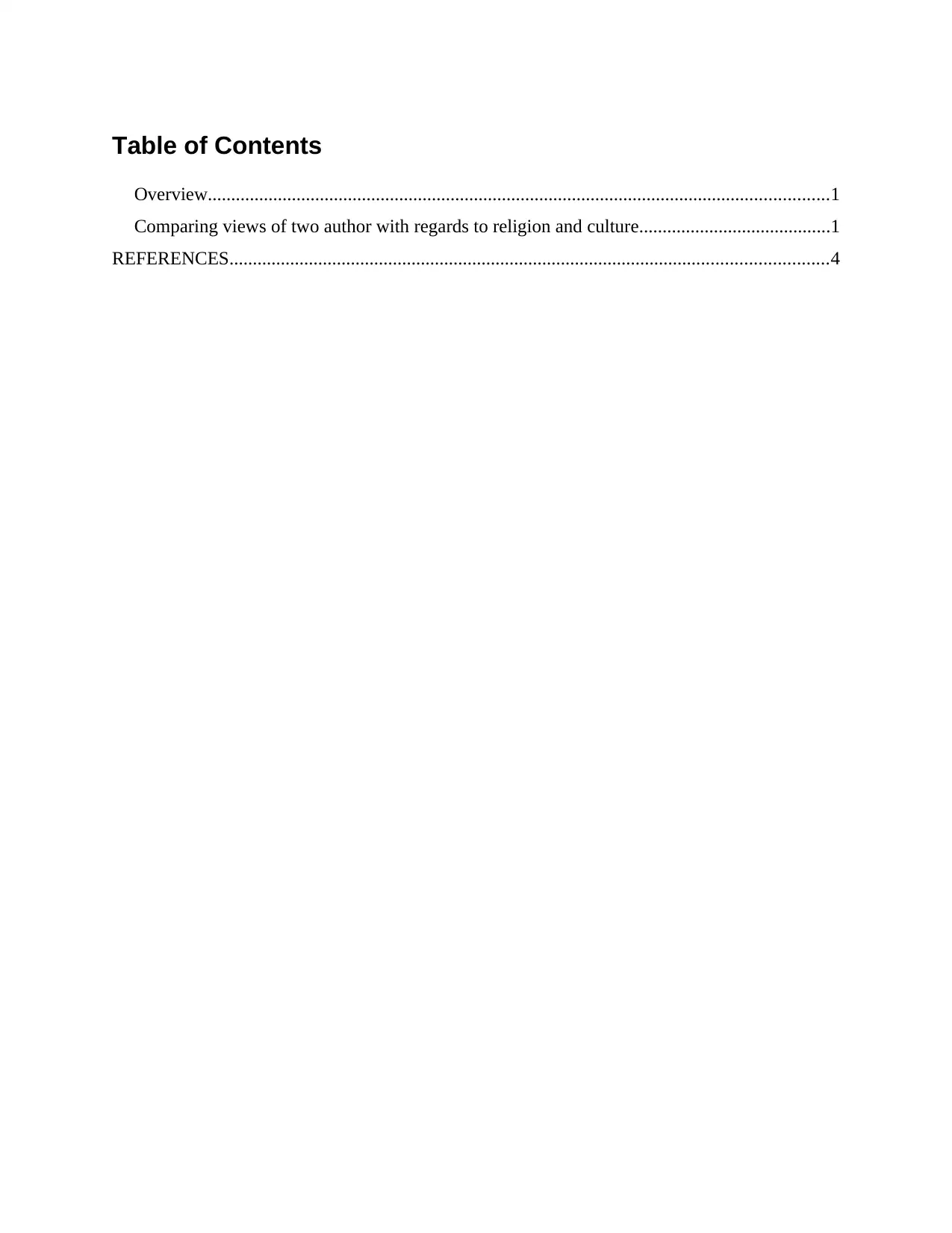
Table of Contents
Overview.....................................................................................................................................1
Comparing views of two author with regards to religion and culture.........................................1
REFERENCES................................................................................................................................4
Overview.....................................................................................................................................1
Comparing views of two author with regards to religion and culture.........................................1
REFERENCES................................................................................................................................4
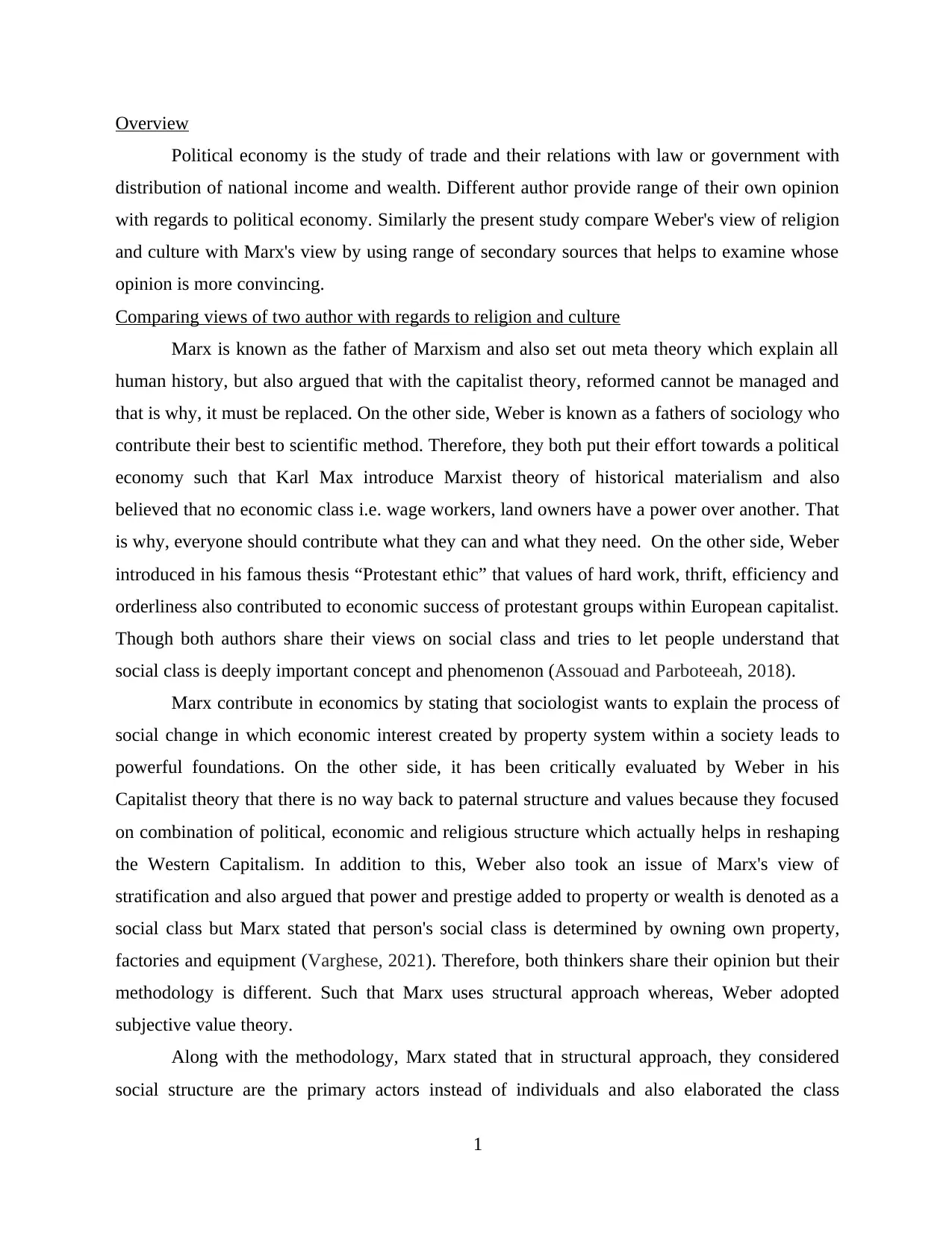
Overview
Political economy is the study of trade and their relations with law or government with
distribution of national income and wealth. Different author provide range of their own opinion
with regards to political economy. Similarly the present study compare Weber's view of religion
and culture with Marx's view by using range of secondary sources that helps to examine whose
opinion is more convincing.
Comparing views of two author with regards to religion and culture
Marx is known as the father of Marxism and also set out meta theory which explain all
human history, but also argued that with the capitalist theory, reformed cannot be managed and
that is why, it must be replaced. On the other side, Weber is known as a fathers of sociology who
contribute their best to scientific method. Therefore, they both put their effort towards a political
economy such that Karl Max introduce Marxist theory of historical materialism and also
believed that no economic class i.e. wage workers, land owners have a power over another. That
is why, everyone should contribute what they can and what they need. On the other side, Weber
introduced in his famous thesis “Protestant ethic” that values of hard work, thrift, efficiency and
orderliness also contributed to economic success of protestant groups within European capitalist.
Though both authors share their views on social class and tries to let people understand that
social class is deeply important concept and phenomenon (Assouad and Parboteeah, 2018).
Marx contribute in economics by stating that sociologist wants to explain the process of
social change in which economic interest created by property system within a society leads to
powerful foundations. On the other side, it has been critically evaluated by Weber in his
Capitalist theory that there is no way back to paternal structure and values because they focused
on combination of political, economic and religious structure which actually helps in reshaping
the Western Capitalism. In addition to this, Weber also took an issue of Marx's view of
stratification and also argued that power and prestige added to property or wealth is denoted as a
social class but Marx stated that person's social class is determined by owning own property,
factories and equipment (Varghese, 2021). Therefore, both thinkers share their opinion but their
methodology is different. Such that Marx uses structural approach whereas, Weber adopted
subjective value theory.
Along with the methodology, Marx stated that in structural approach, they considered
social structure are the primary actors instead of individuals and also elaborated the class
1
Political economy is the study of trade and their relations with law or government with
distribution of national income and wealth. Different author provide range of their own opinion
with regards to political economy. Similarly the present study compare Weber's view of religion
and culture with Marx's view by using range of secondary sources that helps to examine whose
opinion is more convincing.
Comparing views of two author with regards to religion and culture
Marx is known as the father of Marxism and also set out meta theory which explain all
human history, but also argued that with the capitalist theory, reformed cannot be managed and
that is why, it must be replaced. On the other side, Weber is known as a fathers of sociology who
contribute their best to scientific method. Therefore, they both put their effort towards a political
economy such that Karl Max introduce Marxist theory of historical materialism and also
believed that no economic class i.e. wage workers, land owners have a power over another. That
is why, everyone should contribute what they can and what they need. On the other side, Weber
introduced in his famous thesis “Protestant ethic” that values of hard work, thrift, efficiency and
orderliness also contributed to economic success of protestant groups within European capitalist.
Though both authors share their views on social class and tries to let people understand that
social class is deeply important concept and phenomenon (Assouad and Parboteeah, 2018).
Marx contribute in economics by stating that sociologist wants to explain the process of
social change in which economic interest created by property system within a society leads to
powerful foundations. On the other side, it has been critically evaluated by Weber in his
Capitalist theory that there is no way back to paternal structure and values because they focused
on combination of political, economic and religious structure which actually helps in reshaping
the Western Capitalism. In addition to this, Weber also took an issue of Marx's view of
stratification and also argued that power and prestige added to property or wealth is denoted as a
social class but Marx stated that person's social class is determined by owning own property,
factories and equipment (Varghese, 2021). Therefore, both thinkers share their opinion but their
methodology is different. Such that Marx uses structural approach whereas, Weber adopted
subjective value theory.
Along with the methodology, Marx stated that in structural approach, they considered
social structure are the primary actors instead of individuals and also elaborated the class
1
⊘ This is a preview!⊘
Do you want full access?
Subscribe today to unlock all pages.

Trusted by 1+ million students worldwide
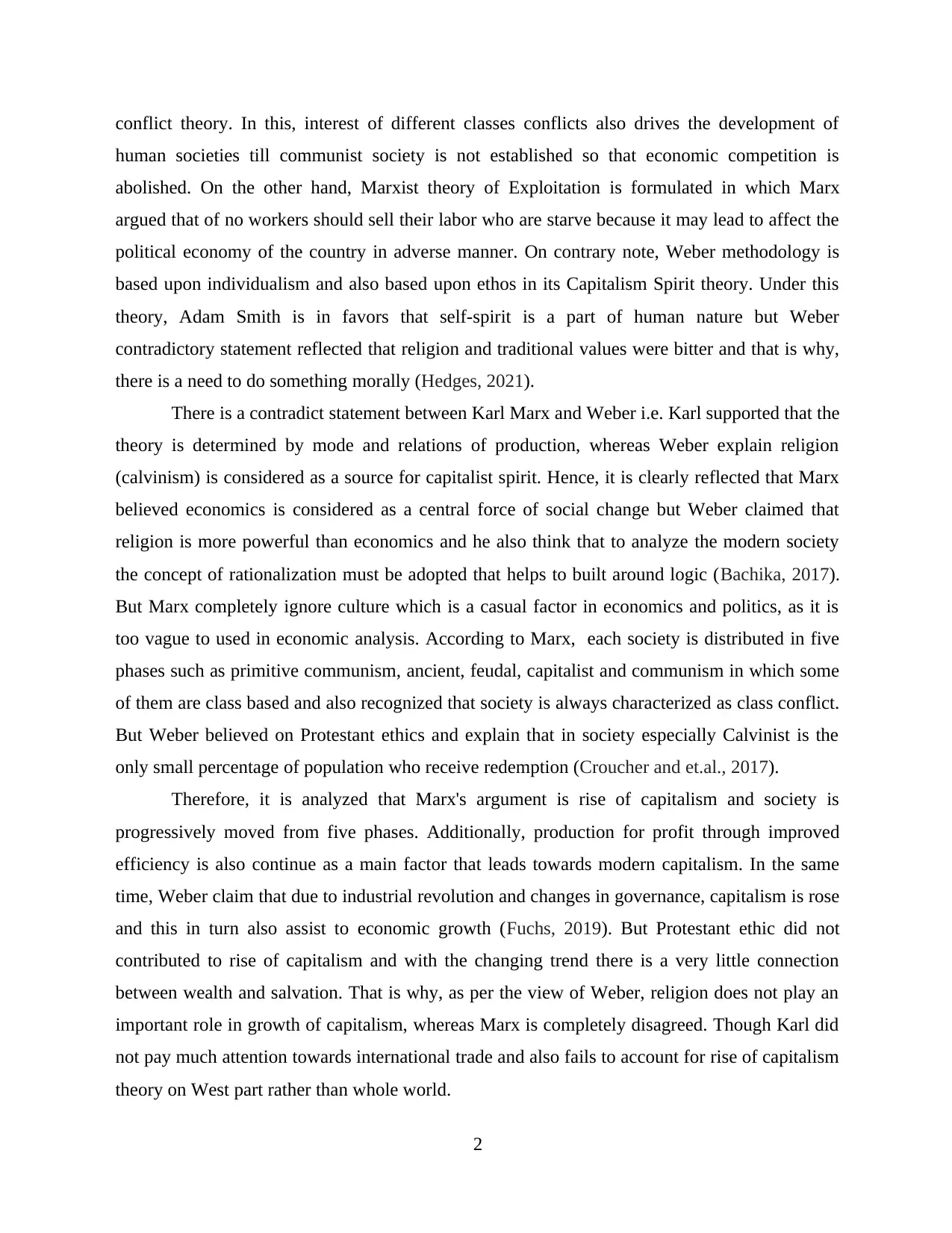
conflict theory. In this, interest of different classes conflicts also drives the development of
human societies till communist society is not established so that economic competition is
abolished. On the other hand, Marxist theory of Exploitation is formulated in which Marx
argued that of no workers should sell their labor who are starve because it may lead to affect the
political economy of the country in adverse manner. On contrary note, Weber methodology is
based upon individualism and also based upon ethos in its Capitalism Spirit theory. Under this
theory, Adam Smith is in favors that self-spirit is a part of human nature but Weber
contradictory statement reflected that religion and traditional values were bitter and that is why,
there is a need to do something morally (Hedges, 2021).
There is a contradict statement between Karl Marx and Weber i.e. Karl supported that the
theory is determined by mode and relations of production, whereas Weber explain religion
(calvinism) is considered as a source for capitalist spirit. Hence, it is clearly reflected that Marx
believed economics is considered as a central force of social change but Weber claimed that
religion is more powerful than economics and he also think that to analyze the modern society
the concept of rationalization must be adopted that helps to built around logic (Bachika, 2017).
But Marx completely ignore culture which is a casual factor in economics and politics, as it is
too vague to used in economic analysis. According to Marx, each society is distributed in five
phases such as primitive communism, ancient, feudal, capitalist and communism in which some
of them are class based and also recognized that society is always characterized as class conflict.
But Weber believed on Protestant ethics and explain that in society especially Calvinist is the
only small percentage of population who receive redemption (Croucher and et.al., 2017).
Therefore, it is analyzed that Marx's argument is rise of capitalism and society is
progressively moved from five phases. Additionally, production for profit through improved
efficiency is also continue as a main factor that leads towards modern capitalism. In the same
time, Weber claim that due to industrial revolution and changes in governance, capitalism is rose
and this in turn also assist to economic growth (Fuchs, 2019). But Protestant ethic did not
contributed to rise of capitalism and with the changing trend there is a very little connection
between wealth and salvation. That is why, as per the view of Weber, religion does not play an
important role in growth of capitalism, whereas Marx is completely disagreed. Though Karl did
not pay much attention towards international trade and also fails to account for rise of capitalism
theory on West part rather than whole world.
2
human societies till communist society is not established so that economic competition is
abolished. On the other hand, Marxist theory of Exploitation is formulated in which Marx
argued that of no workers should sell their labor who are starve because it may lead to affect the
political economy of the country in adverse manner. On contrary note, Weber methodology is
based upon individualism and also based upon ethos in its Capitalism Spirit theory. Under this
theory, Adam Smith is in favors that self-spirit is a part of human nature but Weber
contradictory statement reflected that religion and traditional values were bitter and that is why,
there is a need to do something morally (Hedges, 2021).
There is a contradict statement between Karl Marx and Weber i.e. Karl supported that the
theory is determined by mode and relations of production, whereas Weber explain religion
(calvinism) is considered as a source for capitalist spirit. Hence, it is clearly reflected that Marx
believed economics is considered as a central force of social change but Weber claimed that
religion is more powerful than economics and he also think that to analyze the modern society
the concept of rationalization must be adopted that helps to built around logic (Bachika, 2017).
But Marx completely ignore culture which is a casual factor in economics and politics, as it is
too vague to used in economic analysis. According to Marx, each society is distributed in five
phases such as primitive communism, ancient, feudal, capitalist and communism in which some
of them are class based and also recognized that society is always characterized as class conflict.
But Weber believed on Protestant ethics and explain that in society especially Calvinist is the
only small percentage of population who receive redemption (Croucher and et.al., 2017).
Therefore, it is analyzed that Marx's argument is rise of capitalism and society is
progressively moved from five phases. Additionally, production for profit through improved
efficiency is also continue as a main factor that leads towards modern capitalism. In the same
time, Weber claim that due to industrial revolution and changes in governance, capitalism is rose
and this in turn also assist to economic growth (Fuchs, 2019). But Protestant ethic did not
contributed to rise of capitalism and with the changing trend there is a very little connection
between wealth and salvation. That is why, as per the view of Weber, religion does not play an
important role in growth of capitalism, whereas Marx is completely disagreed. Though Karl did
not pay much attention towards international trade and also fails to account for rise of capitalism
theory on West part rather than whole world.
2
Paraphrase This Document
Need a fresh take? Get an instant paraphrase of this document with our AI Paraphraser
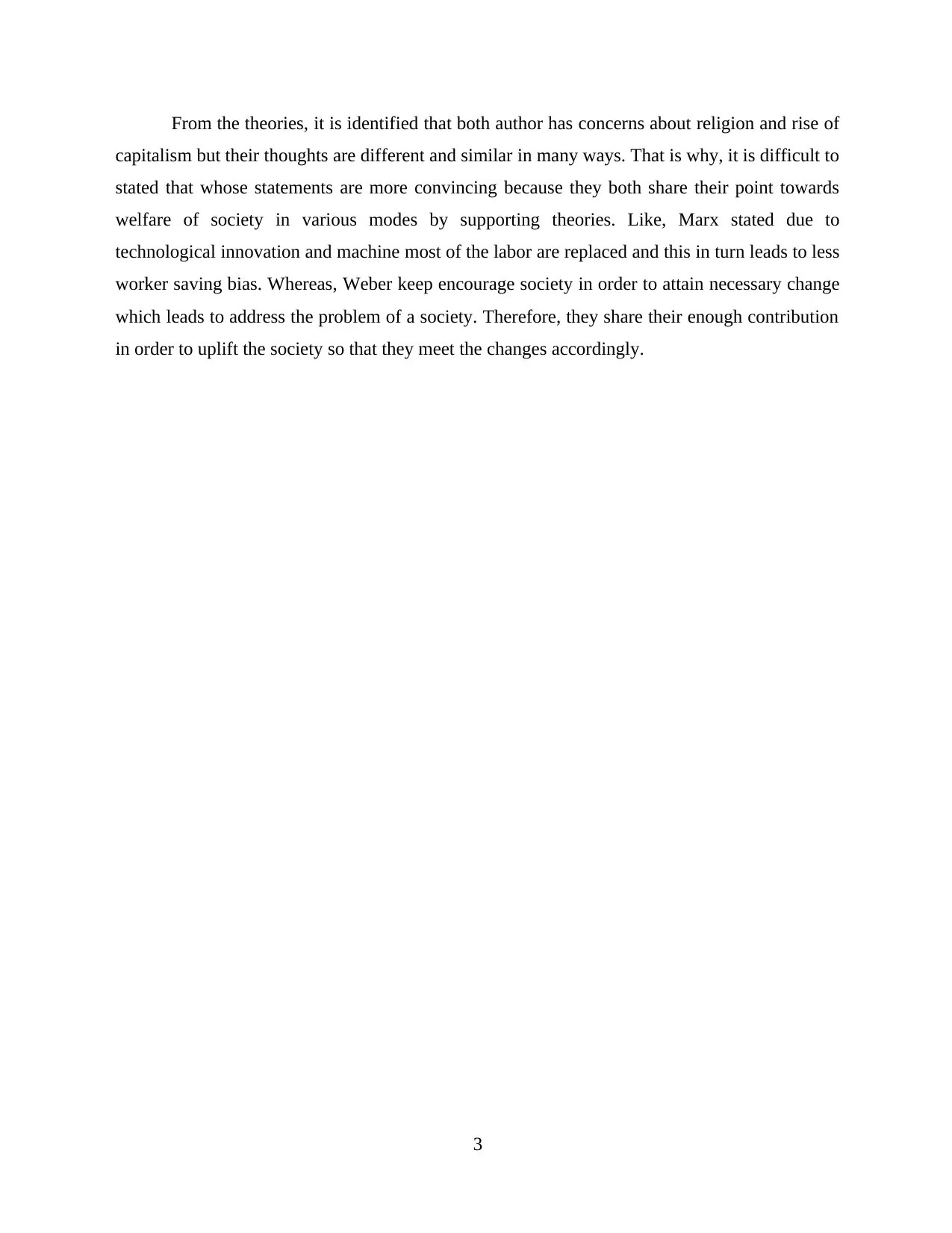
From the theories, it is identified that both author has concerns about religion and rise of
capitalism but their thoughts are different and similar in many ways. That is why, it is difficult to
stated that whose statements are more convincing because they both share their point towards
welfare of society in various modes by supporting theories. Like, Marx stated due to
technological innovation and machine most of the labor are replaced and this in turn leads to less
worker saving bias. Whereas, Weber keep encourage society in order to attain necessary change
which leads to address the problem of a society. Therefore, they share their enough contribution
in order to uplift the society so that they meet the changes accordingly.
3
capitalism but their thoughts are different and similar in many ways. That is why, it is difficult to
stated that whose statements are more convincing because they both share their point towards
welfare of society in various modes by supporting theories. Like, Marx stated due to
technological innovation and machine most of the labor are replaced and this in turn leads to less
worker saving bias. Whereas, Weber keep encourage society in order to attain necessary change
which leads to address the problem of a society. Therefore, they share their enough contribution
in order to uplift the society so that they meet the changes accordingly.
3
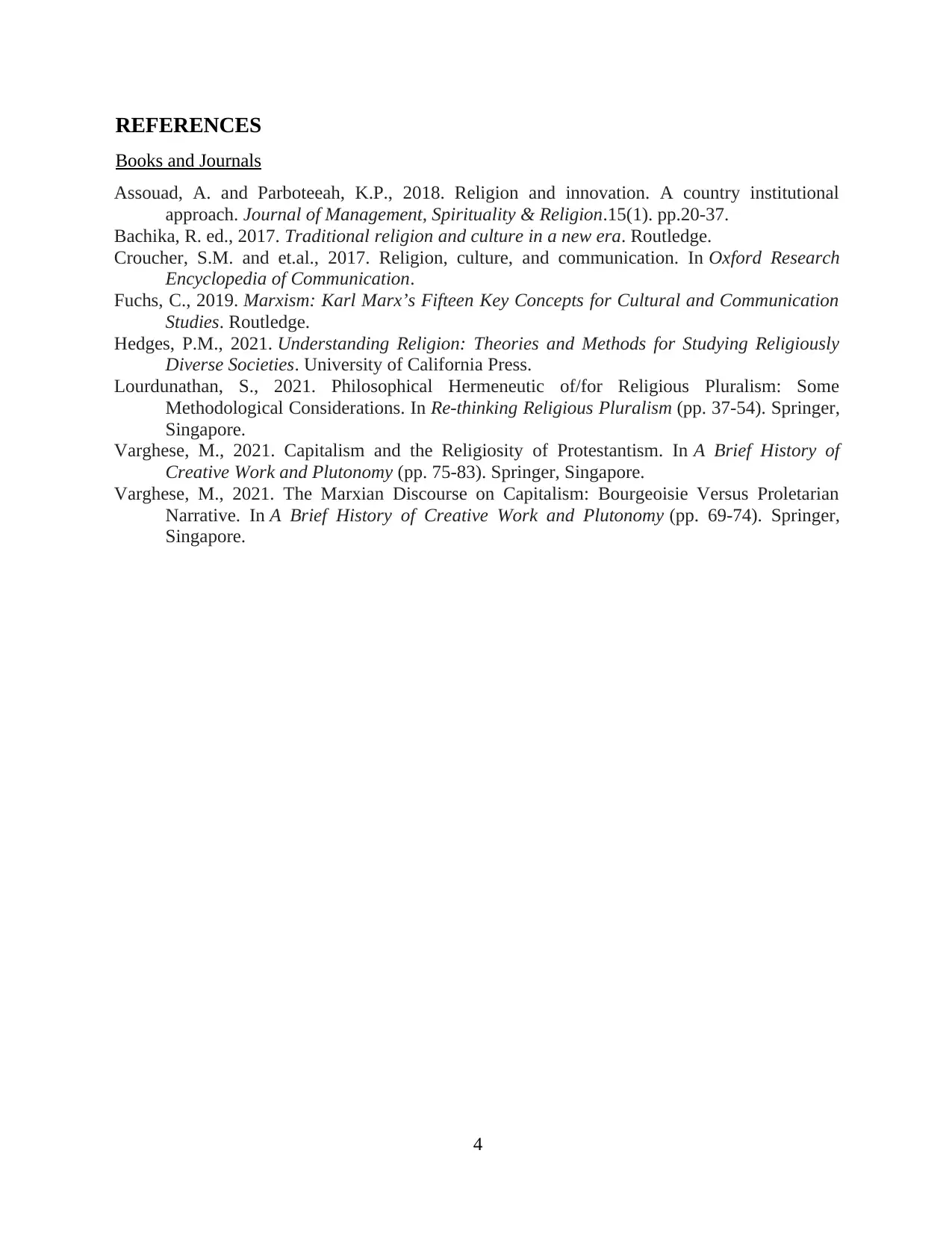
REFERENCES
Books and Journals
Assouad, A. and Parboteeah, K.P., 2018. Religion and innovation. A country institutional
approach. Journal of Management, Spirituality & Religion.15(1). pp.20-37.
Bachika, R. ed., 2017. Traditional religion and culture in a new era. Routledge.
Croucher, S.M. and et.al., 2017. Religion, culture, and communication. In Oxford Research
Encyclopedia of Communication.
Fuchs, C., 2019. Marxism: Karl Marx’s Fifteen Key Concepts for Cultural and Communication
Studies. Routledge.
Hedges, P.M., 2021. Understanding Religion: Theories and Methods for Studying Religiously
Diverse Societies. University of California Press.
Lourdunathan, S., 2021. Philosophical Hermeneutic of/for Religious Pluralism: Some
Methodological Considerations. In Re-thinking Religious Pluralism (pp. 37-54). Springer,
Singapore.
Varghese, M., 2021. Capitalism and the Religiosity of Protestantism. In A Brief History of
Creative Work and Plutonomy (pp. 75-83). Springer, Singapore.
Varghese, M., 2021. The Marxian Discourse on Capitalism: Bourgeoisie Versus Proletarian
Narrative. In A Brief History of Creative Work and Plutonomy (pp. 69-74). Springer,
Singapore.
4
Books and Journals
Assouad, A. and Parboteeah, K.P., 2018. Religion and innovation. A country institutional
approach. Journal of Management, Spirituality & Religion.15(1). pp.20-37.
Bachika, R. ed., 2017. Traditional religion and culture in a new era. Routledge.
Croucher, S.M. and et.al., 2017. Religion, culture, and communication. In Oxford Research
Encyclopedia of Communication.
Fuchs, C., 2019. Marxism: Karl Marx’s Fifteen Key Concepts for Cultural and Communication
Studies. Routledge.
Hedges, P.M., 2021. Understanding Religion: Theories and Methods for Studying Religiously
Diverse Societies. University of California Press.
Lourdunathan, S., 2021. Philosophical Hermeneutic of/for Religious Pluralism: Some
Methodological Considerations. In Re-thinking Religious Pluralism (pp. 37-54). Springer,
Singapore.
Varghese, M., 2021. Capitalism and the Religiosity of Protestantism. In A Brief History of
Creative Work and Plutonomy (pp. 75-83). Springer, Singapore.
Varghese, M., 2021. The Marxian Discourse on Capitalism: Bourgeoisie Versus Proletarian
Narrative. In A Brief History of Creative Work and Plutonomy (pp. 69-74). Springer,
Singapore.
4
⊘ This is a preview!⊘
Do you want full access?
Subscribe today to unlock all pages.

Trusted by 1+ million students worldwide
1 out of 6
Related Documents
Your All-in-One AI-Powered Toolkit for Academic Success.
+13062052269
info@desklib.com
Available 24*7 on WhatsApp / Email
![[object Object]](/_next/static/media/star-bottom.7253800d.svg)
Unlock your academic potential
Copyright © 2020–2026 A2Z Services. All Rights Reserved. Developed and managed by ZUCOL.





